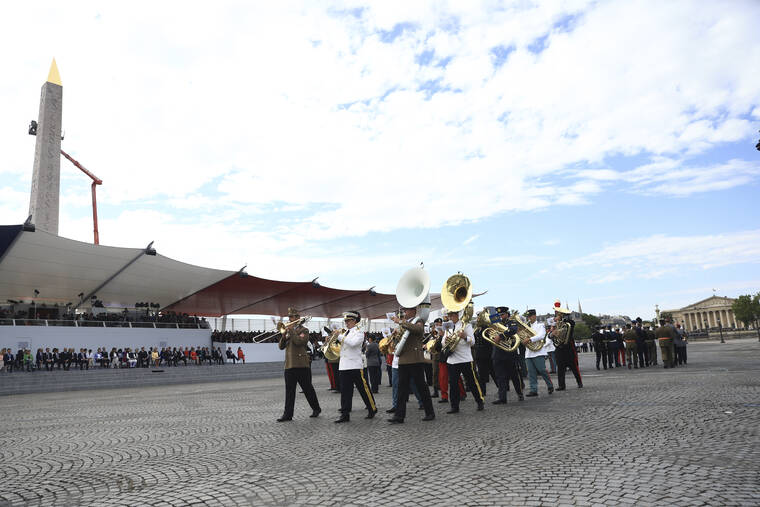France celebrates Bastille Day with parades, parties, extra police
PARIS — French fighter jets trailed red-white-and-blue smoke over Paris monuments, families held picnics and firefighters hosted holiday balls around France to celebrate Bastille Day on Friday, a moment of much-needed festivity after mass protests, riots and political divisions that have riven the country this year.
Not everyone was feeling the spirit of “liberty, equality and fraternity” that the holiday aims to embody. Traditional fireworks displays were banned in some towns, and trams and buses halted after dark across France to prevent new unrest in underprivileged neighborhoods. And an exceptional 130,000 police were deployed around the country to maintain order.
This year, the celebrations marking the start of the French Revolution on July 14, 1789 come in the wake of the nation’s most serious urban violence in nearly 20 years, following the fatal police shooting of a teenager with North African roots that laid bare anger over entrenched inequality and racial discrimination.
Fighter jets and military helicopters whooshed Friday above the site where 17-year-old Nahel Merzouk was killed last month, on Nelson Mandela Square in the Paris suburb of Nanterre, on their way toward the Arc de Triomphe and the VIP guests watching the grandiose Bastille Day parade. Nanterre’s streets were unusually quiet as local residents gathered to watch the flyby.
Just a few kilometers (miles) away, crowds lined the Champs-Elysees to watch the annual parade, which included 6,500 people marching, 94 planes and helicopters, 219 ground vehicles, 200 horses and 86 dogs this year.
India was the guest of honor, with Prime Minister Narendra Modi watching alongside French President Emmanuel Macron. About 240 Indian troops led the march, and French-made Indian warplanes joined the aerial display. France often showcases international partners on Bastille Day.
Russia’s war in Ukraine — central to last year’s Bastille Day celebrations — echoed in this year’s events as well. Vehicles on display included the Caesar anti-missile batteries that France is providing to Ukraine, and Ukrainian officials were invited to join Macron in the VIP seats. Macron gave a posthumous Legion of Honor award to French journalist Arman Soldin, killed in Ukraine earlier this year.
Concerts, parties and parades are held in towns and cities around France to commemorate the storming of the Bastille prison in 1789 that marked the start of the French Revolution, and Friday’s events were largely festive.
Even in Nanterre, site of last month’s police killing, some residents who gathered to watch the holiday flyover saw reasons to celebrate.
“It’s a moment of pleasure,” said Aurélie V., 38, who accompanied her newborn infant to watch the parade. She spoke on condition her last name not be used because of continued tensions in her neighborhood. “I came here to share this with my son, to show the strength of our country.”
But signs of malaise remained.
The roses on a roadside memorial to Merzouk had long withered by Friday’s Bastille Day celebrations. A nearby Monoprix supermarket was still boarded up, and the walls near the intersection where the police shot the teenager were still tagged with words of anger: “Vengeance for Nahel,” anti-police slogan “ACAB,” and “Death to the king,” an apparent dig at what is seen as Macron’s out-of-touch leadership.
The fatal shooting of Merzouk at point-blank range during a traffic stop, captured on video, sparked several days of clashes with police, the burning of hundreds of buildings and vehicles and the looting of stores in cities and towns around France.
A group of activists and immigrants defied a ban on political gatherings Friday and demonstrated in eastern Paris against a proposed immigration bill that would facilitate deportations.
“There’s no equality when we kill a 17-year-old for traffic violations or when we let teenage immigrants sleep in the streets,” said Aimée Kiamenga, a 19-year-old activist with the group SOS Racisme. “France has lost its values, and its system is becoming more and more repressive.”
The protesters also called for an end to police brutality, which advocates say often targets people with African origins. Many people living in neglected housing projects who trace their roots to former French colonies, like Merzouk, struggle with lack of opportunity and day-to-day racism.
Macron hasn’t directly addressed the issues raised by the killing of Merzouk, focusing instead on supporting the exceptionally large number of towns hit by violence and boosting police presence to restore calm. A presidential aide said that the unrest violence had “no impact” on the Bastille Day parade, but noted that the celebrations come “at a time when it is necessary to reaffirm national cohesion.”
The holiday comes after months of mass protests and strikes earlier this year over a law raising the retirement age to 64, which led to a showdown in parliament when Macron’s government used special powers to force it through without a vote. Many voters remain angry over the bill and Macron’s tactics.
Because unrest tends to spike every year around Bastille Day and because France remains on edge, the government deployed an exceptional 130,000 police Thursday and Friday.
Overnight Thursday to Friday, the Interior Ministry reported 97 people arrested in urban violence and 218 cars set alight around the country. That was slightly lower than last year.
———
Bounab reported from Nanterre and Paris.

